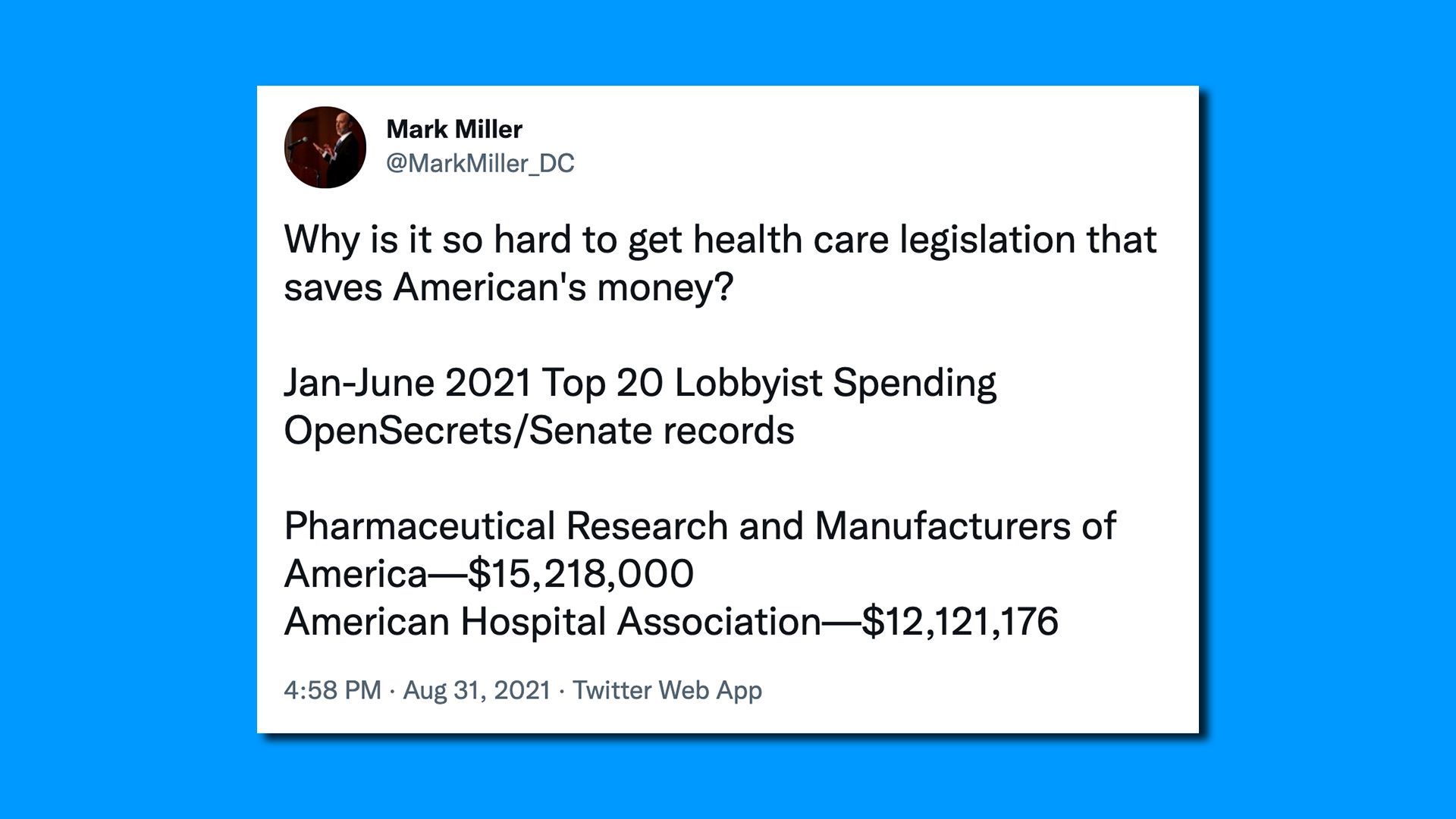| |
| |
| |
| Presented By UnitedHealth Group |
| |
| Axios Vitals |
| By Tina Reed ·Sep 01, 2021 |
| Good morning, Vitals readers. Today's newsletter is 745 words, or a 3-minute read. 🗒 What they're saying: Secretary of State Tony Blinken and HHS Secretary Xavier Becerra published a joint op-ed in JAMA on Tuesday calling for reforms to make "the world safer from future pandemics." - "When governments and organizations share data openly, coordinate policies forthrightly, and take responsibility for missteps so they and everyone can do better, the inevitable result is lives saved," they wrote.
|
| |
| |
| 1 big thing: Tension rises over Biden booster plan |
 |
|
| Illustration: Annelise Capossela/Axios |
| |
| Signs are beginning to publicly emerge that career scientists are frustrated with how the White House has handled coronavirus vaccine boosters, Axios' Caitlin Owens writes. Why it matters: The Biden administration has made clear that its priority, when it comes to boosters, is to stay ahead of the virus. But in doing so, it's also getting ahead of the normal process by which such decisions are usually made. Driving the news: Two top FDA vaccine officials are leaving their positions this fall, the agency announced yesterday. - The officials are leaving, at least in part, because they feel like the FDA is being sidelined, Endpoints reported, and "what finally did it for them was the White House getting ahead of FDA on booster shots."
- On Monday, an independent CDC advisory committee hinted that it will only initially recommend booster shots for older Americans and health care workers — a subtle departure from the administration's plan to offer a booster shot to most Americans eight months after their first round.
- And at least one member of the committee raised concerns about the White House getting ahead of the FDA and the CDC on booster policy, STAT's Helen Branswell tweeted.
The big picture: The CDC recently released data that, like other research, found the vaccines' effectiveness against infection has decreased over time. - On the other hand, the CDC data found that the vaccines' effectiveness against severe disease has held.
What we're watching: The administration has said over and over again that its plan to begin offering boosters on Sept. 20 is dependent on approval from the FDA and the CDC. - Its commitment to that promise may end up being tested in the coming weeks if government scientists don't agree with the plan.
Go deeper. |
    |
| |
| |
| 2. Mandates work, and they're popular |
 Data: Axios/Ipsos Poll; Note: Employer required margin of error +/-7.5% (N=176), employer not required margin of error +/-3.5% (N=877); Chart: Kavya Beheraj/Axios Workers are more likely to get vaccinated when their employers require them to, according to the latest installment of the Axios/Ipsos Coronavirus Index. By the numbers: 80% of respondents whose employers require a COVID-19 vaccine said they were already vaccinated and another 10% said they were likely to get a vaccine. - In comparison, at employers with no vaccine requirement, 68% said they'd already been vaccinated and another 6% were likely to get the vaccine.
- Meanwhile, 11% of respondents at employers with mandates said they were either "not likely" or were a "hard pass" on the idea, compared to 27% at employers with no mandates.
What we're watching: Mandates will likely accelerate over the next several months, according to a new report by advisory firm Willis Towers Watson. - 52% of the employers surveyed said they may impose a mandate — which would be a dramatic increase from the 21% who mandate vaccines now.
- Nearly a third of employers said they might make vaccination a requirement to gain access to the workplace, while about one in five considering making vaccination a condition of employment.
Share this story. |
    |
| |
| |
| 4. COVID hasn't affected Medicare's solvency |
 |
|
| Medicare's hospital trust fund is projected to be depleted by 2026. Photo: Brandon Bell/Getty Images |
| |
| Medicare won't be able to fully pay for patients' hospital bills by 2026, a similar forecast from last year, according to the latest report from Medicare's trustees, Axios' Bob Herman writes. The big picture: The pandemic "is not expected to have a large effect on the financial status of the trust funds after 2024," the trustees said. - The surge in layoffs lowered payroll taxes, which fund Medicare, and the federal government had to shoulder expenses tied to COVID-19 hospitalizations, tests and vaccines for Medicare enrollees.
- However, "spending for non-COVID care declined significantly," the trustees wrote.
What to watch: Medicare's private insurance option and a pricey new drug will factor heavily into the program's finances. - Medicare Advantage enrollment is projected to rise drastically faster than the trustees anticipated last year. That could suck a lot more money from the hospital trust fund, since Medicare Advantage plans cost more than traditional Medicare.
|
    |
| |
| |
| A message from UnitedHealth Group |
| Advancing health equity by addressing social determinants of health |
| |
 |
| |
UnitedHealth Group is committed to addressing social barriers that influence disparities in health care access, outcomes and affordability. We have helped: - Create 12,000 homes by investing $550 million in affordable housing.
- Provide over 100 million meals during the pandemic.
Learn more. |
| |
| |
| 5. The quantifiable impacts of air pollution |
 Particulate pollution is the world's greatest threat to human health, with South Asia consistently ranking among the most polluted regions in the world, according to a new report from the Energy Policy Institute at the University of Chicago. Why it matters: The average person on the planet is losing about 2.2 years of life expectancy due to air pollution, as shown in the group's Air Quality Life Index, Axios' Andrew Freedman writes. - The most hazardous particulate matter is known as PM2.5, due to its tiny size of 2.5 micrometers, much smaller than the width of a human hair. These particles are generated from the burning of fossil fuels and other sources, and are harmful to human health.
Read more. |
    |
| |
| |
| 6. Tweet du jour: Life's big questions |
 |
|
| Illustration: Annelise Capossela/Axios |
| |
    |
| |
| |
| A message from UnitedHealth Group |
| Expanding access to care in underserved communities |
| |
 |
| |
| UnitedHealth Group is helping to address social determinants of health for uninsured individuals and underserved communities. See how we're advancing health equity through community partnerships that have helped more than 6 million people access care, nutritious food and stable housing. |
| |
 | | It'll help you deliver employee communications more effectively. | | |









No comments:
Post a Comment